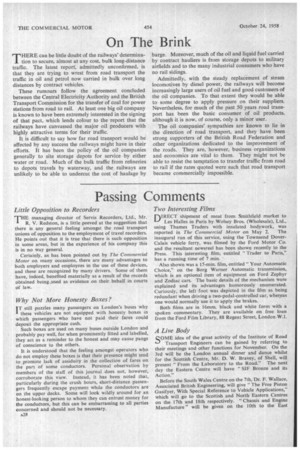On The Brink
Page 30

If you've noticed an error in this article please click here to report it so we can fix it.
T'THERE can be little doubt of the railways' determination to secure, almost at any cost, bulk long-distance traffic. The latest report', admittedly unconfirmed, is that they are trying to wrest from road transport the traffic in oil and petrol now carried in bulk over long distances by contract vehicles.
These rumours follow the agreement concluded between the Central Electricity Authority and the British Transport Commission for the transfer of coal for power stations from road to rail. At least one big oil company is known to have been extremely interested in the signing of that pact, which lends colour to the report that the railways have canvassed the major oil producers with highly attractive terms for their traffic.
It is difficult to say how far road transport would be affected by any success the railways might have in their efforts. It has been the policy of the oil companies generally to site storage depots for service by either water or road. Much of the bulk traffic from refineries to depots travels by waterway, and the railways are unlikely to be able to undercut the cost of haulage by barge. Moreover, much of the oil and liquid fuel carried by contract hauliers is from storage depots to military airfields and to the many industrial consumers who have no rail sidings.
Admittedly, with the steady replacement of steam locomotives by diesel power, the railways will become increasingly large users of oil fuel and good customers of the oil companies. To that extent they would be able• to some degree to apply pressure on their suppliers. Nevertheless, for much of the past 50 years road transport has been the basic consumer of oil products, although it is now, of course, only a minor user.
The oil companies' sympathies are known to lie in the direction of road transport, and they have been strong supporters of the British Road Federation and other organizations dedicated to the improvement of the roads. They are, however, business organizations and economics are vital to them. They might not be able to resist the temptation to transfer traffic from road to rail if the rates quoted were such that road transport became commercially impossible.




































































































